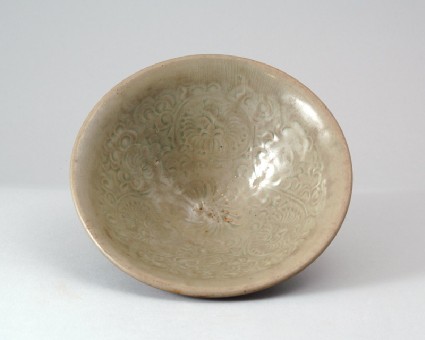Browse: 230 objects
Greenware bowl with floral decoration
- loan
-
Details
- Associated place
-
Asia › China › Henan province (possible place of creation)Asia › China › Shaanxi province (possible place of creation)
- Date
-
11th - 12th century (1001 - 1200)
Northern Song Dynasty (AD 960 - 1127)
Jin Dynasty (1115 - 1234)
- Material and technique
- stoneware, thrown, with incised and press-moulded decoration under a green glaze; glazed base; glazed rim
- Dimensions
-
7.5 cm (height)
20 cm (diameter)
- Material index
- Technique index
-
formed › moulded › press moulded,
- Object type index
- No. of items
- 1
- Credit line
- Lent by the Sir Alan Barlow Collection Trust.
- Accession no.
- LI1301.431
-
Further reading
University of Sussex, and Arts and Humanities Research Council, The Barlow Collection, supervised by Regina Krahl, Maurice Howard, and Aiden Leeves (Sussex: University of Sussex, 2006), no. C281
Glossary (2)
glaze, stoneware
-
glaze
Vitreous coating applied to the surface of a ceramic to make it impermeable or for decorative effect.
-
stoneware
Ceramic material made of clay which is fired to a temperature of c.1200-1300⁰c and is often buff or grey in colour.
Location
-
- currently in research collection
Objects are sometimes moved to a different location. Our object location data is usually updated on a monthly basis. Contact the Jameel Study Centre if you are planning to visit the museum to see a particular object on display, or would like to arrange an appointment to see an object in our reserve collections.
Publications online
-

The Barlow Collection
Similar to the bowl, [LI1301.288], also in the Barlow Collection, but larger and less fine in quality, this bowl was probably made by one of the kilns copying Yaozhou, in Shaanxi or in the neighboring province of Henan. A similar, but much smaller bowl with a different family name in the centre, in the Palace Museum, Beijing, has been attributed to the Linru kilns of Henan (The Complete Collection of Treasures of the Palace Museum: Porcelain of the Song Dynasty (I), Hong Kong, 1996, no.147).
The bowl has slightly rounded conical sides, the rim is everted with an angle on the outside and curved on the inside, the short tapering foot has a low broad footring. The piece is moulded with a stylized flower scroll with a fully opened bloom in the centre, surrounded by a scroll with three similar blooms between smaller ones seen in profile, among dense overall foliage. The central bloom is inscribed with the chacter yang (a family name). The rim area is left plain, the outside shows simple radiating strokes cut with a knife held at an angle. The pale green glaze leaves only the footring free, where the brown biscuit is revealed. An accidental unglazed patch on the outside has burnt a reddish brown.
© 2013 University of Oxford - Ashmolean Museum




